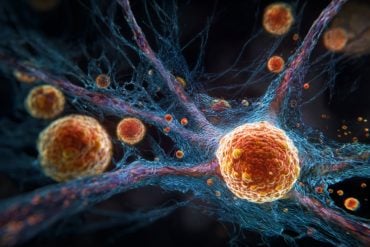Summary: A new Lancet study reports auditory hallucinations may be reduced in people with schizophrenia following face-to-face discussions with an avatar that says the things they hear. Researchers report the patients were able to verbalize their feeling by ‘standing up to’ the avatars and taking control of the conversations.
Source: King’s College London.
An experimental therapy which involves a face-to-face discussion between a person with schizophrenia and an avatar representing their auditory hallucination may help reduce symptoms, when provided alongside usual treatment, according to a study led by King’s College London and published in The Lancet Psychiatry journal.
The randomised controlled trial compared the avatar therapy to a form of supportive counselling (adapted specifically for the study). It found that avatar therapy was more effective at reducing hallucinations at 12-week follow-up, and had a large effect size.
Further research to investigate the treatment’s effectiveness in other healthcare settings will be needed, and so the treatment is not yet widely available.
The study is the first large-scale randomized controlled trial of this type of therapy, and was used in people with schizophrenia who had had persistent and distressing auditory hallucinations for more than a year, despite treatment. All participants continued to receive their usual treatment throughout the trial.
Around 60-70 per cent of people who have schizophrenia experience auditory hallucinations that are typically insulting and threatening. For most people, drug treatments reduce these symptoms, but approximately one in four people continue to experience voices. Cognitive behavioural therapy for psychosis (CBTp) can also be helpful but is a lengthy therapy with at times limited effects on voices.
‘A large proportion of people with schizophrenia continue to experience distressing voices despite lengthy treatment, so it is important that we look at newer, effective and shorter forms of therapy,’ says lead author Professor Tom Craig from King’s College London, and the South London and Maudsley NHS Foundation Trust, UK.
He adds: ‘Our study provides early evidence that avatar therapy rapidly improves auditory hallucinations for people with schizophrenia, reducing their frequency and how distressing they are, compared to a type of counselling. So far, these improvements appear to last for up to six months for these patients. However, these results come from one treatment centre and more research is needed to optimise the way the treatment is delivered and demonstrate that it is effective in other NHS settings.’
This study, which took place at Maudsley Hospital SHARP clinic and the Institute of Psychiatry, Psychology & Neuroscience at King’s College London, involved 150 patients who had had schizophrenia for approximately 20 years and heard 3-4 voices on average. Of these, 75 people had the avatar therapy and the other 75 people had a form of supportive counselling designed for this study. They also continued with their usual antipsychotic medication throughout the trial.
The avatar therapy took place over six sessions, with one 50-minute session each week. Before starting treatment, patients worked with the therapist to create a computerised simulation (avatar) of the voice they most wanted to influence – including what the voice said, how it sounded, and how it could look. Therapy involved a three-way conversation between the patient, therapist, and avatar with the therapist speaking as themselves and also voicing the avatar.
In each session, after discussing the targets for that day’s work, patients spent 10-15 minutes speaking face-to-face with the avatar, practising standing up to it, correcting any misconceptions it had about them, and taking control of the conversation, so that power shifted from the avatar to the patient. The avatar came to recognise the patient’s strengths and good qualities, and the patient’s greater control and power in the relationship. The sessions were recorded, and an audio recording was given to the patient to take home to listen to when they heard the voices.

The supportive counselling ran for the same number and length of sessions. It encouraged patients to discuss any issues of concern to them and aimed to lessen distress and discuss practical ways of improving their quality of life. As with avatar therapy, at the end of the session, each patient recorded a positive message to listen to during the following week.
Assessments of the patients’ auditory hallucinations were completed by researchers who were blind to which treatments patients had had.
After 12 weeks, the avatar group’s symptoms were rated as less severe than those who received counselling.
People who had received avatar therapy also found their hallucinations less distressing and less powerful than people in the counselling group. Seven people who had the avatar therapy and two in the counselling group also reported that their hallucinations had completely disappeared after 12 weeks.
The rapid improvements seen in the avatar treatment group were sustained at 24 weeks. However, during this time, hallucinations continued to become less frequent and less distressing for the counselling group also, likely because counselling could be a potentially useful therapy. As a result, there were no differences in outcomes between the two groups at 24 weeks.
Ann Mills-Duggan, from Wellcome’s Innovations team who funded the £1.3m trial, said: ‘Schizophrenia affects 1 in 100 people, often with a devastating effect, making it impossible for people to work and sustain relationships. Avatar therapy is a promising new approach and these early results are very encouraging. If the researchers can show that this therapy can be delivered effectively by different therapists in different locations, this approach could radically change how millions of psychosis sufferers are treated across the world.’
The researchers note some limitations, including that the counselling was conducted by graduate trainee therapists, which may impact the effectiveness of the counselling. In addition, it is not yet clear whether avatar therapy will be easy for the wider mental health workforce to deliver, as the study was conducted in a centre with expertise in treating psychosis and the avatar therapy was delivered by very experienced therapists.
The researchers aim to conduct a cost-effectiveness analysis, and investigate further the mechanisms of how the treatment reduces symptoms.
Funding: This study was funded by the Wellcome Trust, and was conducted by researchers from the Institute of Psychiatry, Psychology & Neuroscience at King’s College London, Royal Free and University College Medical School, University College London, The University of Manchester, Manchester Academic Health Science Centre.
Source: Jack Stonebridge – King’s College London
Publisher: Organized by NeuroscienceNews.com.
Image Source: NeuroscienceNews.com image is credited to the researchers.
Video Source: Video credited to King’s College London.
Original Research: Full open access research for “AVATAR therapy for auditory verbal hallucinations in people with psychosis: a single-blind, randomised controlled trial” by Prof Tom KJ Craig, PhD’Correspondence information about the author Prof Tom KJ CraigEmail the author Prof Tom KJ Craig, Mar Rus-Calafell, PhD, Thomas Ward, DClinPsy, Prof Julian P Leff, FRCPsych, Prof Mark Huckvale, PhD, Elizabeth Howarth, PhD, Prof Richard Emsley, PhD, Prof Philippa A Garety, PhD in The Lancet. Published online November 23 2017 doi:10.1016/S2215-0366(17)30427-3
[cbtabs][cbtab title=”MLA”]King’s College London “Avatar Therapy May Help Reduce Auditory Hallucinations in People With Schizophrenia.” NeuroscienceNews. NeuroscienceNews, 24 November 2017.
<https://neurosciencenews.com/schizophrenia-avatar-auditory-hallucinations-8020/>.[/cbtab][cbtab title=”APA”]King’s College London (2017, November 24). Avatar Therapy May Help Reduce Auditory Hallucinations in People With Schizophrenia. NeuroscienceNews. Retrieved November 24, 2017 from https://neurosciencenews.com/schizophrenia-avatar-auditory-hallucinations-8020/[/cbtab][cbtab title=”Chicago”]King’s College London “Avatar Therapy May Help Reduce Auditory Hallucinations in People With Schizophrenia.” https://neurosciencenews.com/schizophrenia-avatar-auditory-hallucinations-8020/ (accessed November 24, 2017).[/cbtab][/cbtabs]
Abstract
AVATAR therapy for auditory verbal hallucinations in people with psychosis: a single-blind, randomised controlled trial
Background
A quarter of people with psychotic conditions experience persistent auditory verbal hallucinations, despite treatment. AVATAR therapy is a new approach in which people who hear voices have a dialogue with a digital representation (avatar) of their presumed persecutor, voiced by the therapist so that the avatar responds by becoming less hostile and concedes power over the course of therapy. We aimed to investigate the effect of AVATAR therapy on auditory verbal hallucinations, compared with a supportive counselling control condition.
Methods
We did this single-blind, randomised controlled trial at a single clinical location (South London and Maudsley NHS Trust). Participants were aged 18 to 65 years, had a clinical diagnosis of a schizophrenia spectrum (ICD10 F20–29) or affective disorder (F30–39 with psychotic symptoms), and had enduring auditory verbal hallucinations during the previous 12 months, despite continued treatment. Participants were randomly assigned (1:1) to receive AVATAR therapy or supportive counselling with randomised permuted blocks (block size randomly varying between two and six). Assessments were done at baseline, 12 weeks, and 24 weeks, by research assessors who were masked to therapy allocation. The primary outcome was reduction in auditory verbal hallucinations at 12 weeks, measured by total score on the Psychotic Symptoms Rating Scales Auditory Hallucinations (PSYRATS–AH). Analysis was by intention-to-treat with linear mixed models. The trial was prospectively registered with the ISRCTN registry, number 65314790.
Findings
Between Nov 1, 2013, and Jan 28, 2016, 394 people were referred to the study, of whom 369 were assessed for eligibility. Of these people, 150 were eligible and were randomly assigned to receive either AVATAR therapy (n=75) or supportive counselling (n=75). 124 (83%) met the primary outcome. The reduction in PSYRATS–AH total score at 12 weeks was significantly greater for AVATAR therapy than for supportive counselling (mean difference −3·82 [SE 1·47], 95% CI −6·70 to −0·94; p<0·0093). There was no evidence of any adverse events attributable to either therapy.
Interpretation
To our knowledge, this is the first powered, randomised controlled trial of AVATAR therapy. This brief, targeted therapy was more effective after 12 weeks of treatment than was supportive counselling in reducing the severity of persistent auditory verbal hallucinations, with a large effect size. Future multi-centre studies are needed to establish the effectiveness of AVATAR therapy and, if proven effective, we think it should become an option in the psychological treatment of auditory verbal hallucinations.
Funding
Wellcome Trust.
“AVATAR therapy for auditory verbal hallucinations in people with psychosis: a single-blind, randomised controlled trial” by Prof Tom KJ Craig, PhD’Correspondence information about the author Prof Tom KJ CraigEmail the author Prof Tom KJ Craig, Mar Rus-Calafell, PhD, Thomas Ward, DClinPsy, Prof Julian P Leff, FRCPsych, Prof Mark Huckvale, PhD, Elizabeth Howarth, PhD, Prof Richard Emsley, PhD, Prof Philippa A Garety, PhD in The Lancet. Published online November 23 2017 doi:10.1016/S2215-0366(17)30427-3






